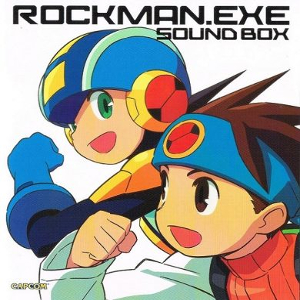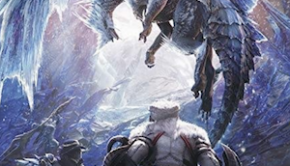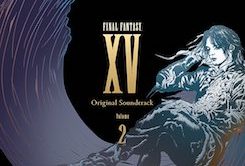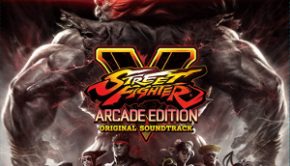Mega Man Battle Network Sound Box
 |
Album Title: Mega Man Battle Network Sound Box (Rockman EXE Sound Box) |
| Record Label: Suleputer |
|
| Catalog No.: CPCA-10410/5 |
|
| Release Date: June 15, 2016 |
|
| Purchase: Buy at CDJapan |
Overview
The Mega Man Battle Network series takes place in a parallel universe to the Mega Man series in which networking technology advanced over robotics. The gameplay of the series shifted away from the action platforming roots of the Mega Man franchise in favour of a curious blend of RPG, action, and adventure elements. Between 2001 and 2005, Capcom released some six main games of the series on the Game Boy Advance, as well as several spinoffs and ports. Each main game in the series featured between 30 to 45 minutes of chiptune music principally written by series’ veterans Akari Kaida (Mega Man & Bass), Yoshino Aoki (Mega Man Star Force), and Toshihiko Horiyama (Mega Man 7). This six-disc box set compiles the soundtracks for all six main games in the series, as well as four other titles, in an expensive collector’s item. Let’s take a closer look…
Body
The first two discs of the soundtrack replicate the content of the series’ first album release. The title theme for Mega Man Battle Network sets the scene for what to expect for the rest of the sound box. Akari Kaida generally follows the approach of the Mega Man titles for the NES: three musical voices, a simple binary form, and a strong melodic focus. While the track could have been a pale imitation, Kaida ensures the melody is an unforgettable one and fills it with the free spirit of MegaMan.EXE. Even the synthesis here is reminiscent of the NES titles. Rather than use the Game Boy Advance’s feeble sound chip to imitate acoustic instruments, Kaida harnesses it to create a pleasant chiptune sound that somehow fits with the game’s retrofuturistic visuals. The melodic chiptune influence continues with the free-spirited “Hometown”, frivolous “School”, and more reflective “Moment of Fate”, which are used during the RPG-like sequences in the game’s overworld. Among the stage themes, long-time fan favourite “Fire Field” captures the image of FireMan with a suitably edgy composition blending rock-spirited melodies typical of the series with more irregular phrasing and beat-heavy sections during the development. By contrast, the electronic fusions “Electrical Crisis” and “Boundless Network” reflect the game’s futuristic setting; whereas the former is a pulsating action track befitting ElecMan’s stage, the latter is filled with transcendent ambient synthpads. Between these highlights, there’s also the discordant “Red or Blue”, tense “Cold and Silent”, and the surprisingly plodding final stage theme “Void”. These tracks bring plenty of variety to the gameplay, but will have relatively niche stand-alone appeal given their relatively bland melodies and approaches. The three battle tracks are better than average Mega Man fare, each suitably blending tense rhythm elements with motivating melodic elements to different degrees, while the ending theme is an inspired piano-laced remix of the main theme.
For the sequel, Yoshino Aoki stayed faithful to her contemporary’s overall approach while developing upon it in a number of ways. Retreads such as “Hometown” and “Proof of Bravery” blend the original game’s chiptune melodies with techno beats befitting the series setting. There’s also tonnes of new RPG-like tunes that embellish the game’s overworld. “Okuden Dani”, “Begin a Journey”, and “Country Town Scenery” prove excellent ‘strolling tunes’ thanks to their catchy melodies and NES RPG influences. However, others are fast-looping, repetitive tracks such as “Alley”, “Underground Prison”, “Secret Manoeuvres”, or “At the Edge of Sorrow”. These tracks were generally used in minor circumstances in the game, but prove quite troublesome additions to the soundtrack release. The stage themes for Mega Man Battle Network 2 are also somewhat disappointing. “Smoky Field”, “A Serious Mission”, and “Fear in the Castle” are decent compositions, but on the lower end of the Mega Man stage theme rankings. Worse still, the frantic and dissonant themes for QuickMan (“Time Limit”) and MagneticMan (“Magnetic Airplane”) will be instant turnoffs for many listeners; they certainly fit the enemies they portray, but are so overbearing that most stand-alone listeners and game players won’t tolerate them. Making up for these disappointments, the final stage theme “You Can’t Go Back” is a fantastic Mega Man anthem filled with heroic melodies and choppy bass lines. The Internet theme is clearly inspired by “Boundless Network”, but with a stronger focus on melody over soundscaping, whereas its dark counterpart “Fearful” is filled with dissonant electronic noise. Another further highlight is “And You Will Know the Truth”, an elaborate remix of the series’ main theme. Rounding off the soundtrack are the three battle tracks, including the stellar “Virus Busting”, as well as a mellow ending theme exuding with 8-bit charm.
The second disc of the box set is dedicated to Aoki’s more consistent score for the third game in the series. Aoki demonstrates greater confidence in capturing that NES adventure sound with the likes of “Sea Breeze Town”, “Scientific Forefront”, and “N1 Grand Prix!”. These tracks feel considerably tighter in both composition and implementation than those featured earlier in the series. Of course, they each feature ultra-hummable melodies too. Aoki also offers some bolder explorations of electronic timbres this time round, most notably in the rich techno track “Navi Customiser”, the ethereal Internet theme “Network is Spreading”, and the distorted “Dangerous Black”. Between such highlights, there are occasional disappointments such as the repetitive peppy sounds of “TV Station” and generic sinister theme “Hell Island”, but they’re not as numerous as those of the last instalment. The stage themes are a definite improvement too, though are few in number given the series shift towards RPG over action influences. With “Maze of Wilderness”, she captures the disorientating in-game environment with fast pacing and dissonant phrasing, while still offering listeners a pleasant overall experience with catchy melodies and motivating beats. The first and last stage themes, “Build Mode” and “Final Transmission”, are catchy chiptune anthems written in the trademark style of the Mega Man series. The battle themes are more numerous this time round, with stand-alone highlights including “Shooting Enemy” with its motivating melodies and “VS. Proto” with its fabulous arpeggiations, while the ending theme “farewell” suitably rounds off the series’ joint best soundtrack. The disc closes with four bonus arrangements that Aoki created for the original two-disc soundtrack release. While the two electronic remixes are solid, the standouts are the sophisticated impressionistic solo piano arrangement of “Tree of Life” and an emotional a capella performance of “farewell”.
Discs three and four replicate the content of the second album release for the Mega Man Battle Network. For Mega Man Battle Network 4, composer goes back to basics – rejecting Yoshino Aoki’s increasing fusion influences in favour of more authentic chiptune elements and a new sound palette – to mixed results. The battle theme “Cyber Battle”, rather than incorporate electronic elements, is stripped down to just three 8-bit sound channels, just like a NES soundtrack. However, Horiyama’s ingenious writing of the lead and rhythm parts ensures the music still packs quite a punch. “Save Our Planet” is a similarly-styled track reminiscent of some of the best music from Horiyama’s video game debut, Mega Man X. But while the ‘back to basics’ concept for Mega Man Battle Network 4’s soundtrack was an inspired one, it seems that Horiyama also sometimes used it as an excuse to make some rudimentary compositions. “Silent Darkness” is a dark ambient composition that reverberates between three suspended chords and a scalar treble motif. In addition to being musically simplistic, it proves extremely boring to listen to on a stand-alone level and creates little atmosphere in context. The disappointments continue along the way with the likes of “In the Room” and “Story of Wonder” with their 15 second loops, “Player Admission” and “Versus” with their jarring discords, or “Incident!”, a most unwelcome returnee from earlier in the series. The soundtrack does go some way to compensate for these failings with the superb aforementioned battle tracks, as well as an excellently integrated new theme. Its introduction in “Theme of Rockman EXE4” is filled with the charismatic melodies and bittersweet undertones of 80s rock anthems. Horiyama cleverly incorporates the theme into multiple other tracks, including the sombre interlude “Sad Rain”, the final countdown “Under Justice”, and another solid ending theme.
The soundtrack for the Japan-only spinoff title Rockman EXE 4.5: Real Operation is featured at the end of the third disc and start of the fourth disc. For the soundtrack, Kaida and Horiyama wrote individual character themes for each of the 21 Navi companions that can be chosen for the NetBattle tournaments. While some of these tracks are brand new compositions, for example the jazzy ThunderMan and NumberMan, the majority are direct remixes of stage themes from the original Mega Man series. The themes for GutsMan and IceMan are direct remixes from the original Mega Man, whereas the themes for WoodMan and MetalMan are based on the hit soundtrack to Mega Man 2. Later games in the original series also receive plenty of attention, for example with a trifecta of Mega Man 6 tunes or the Bass arrangement from Mega Man 7. The arrangements themselves aren’t anything special, but they properly highlight the original melodies while staying faithful to the chiptune sound of the Battle Network series. As for the new compositions, Akari Kaida’s guest contributions are all impressive. Her battle themes “Battlefield”, “Tournament Battle”, and “The Fighter’s Soul” rank as some of the best in the series. The first two build on the sound she established for the original Mega Man Battle Network title with their rousing melodies, frenetic rhythms, and chiptune stylings. “The Fighter’s Soul”, on the other hand, is a jagged track that drives much of the chaos in the final battle. On the other hand, Horiyama’s offerings mostly disappoint. He is responsible for most of the short repetitive tracks, such as “PET Display”, “Lecture”, “Tournament Under Way”, and “Awaken the Wind” that bring little to the experience. His main, Internet, and ending themes are more elaborate, but lack the charm or personality of those of the main series.
Following two fairly disappointing instalments to the series, Akari Kaida took the reins once more as the sole composer of Mega Man Battle Network 5 featured in the second portion of the fourth disc. She ends up delivering the most polished soundtrack in the series to date, though doesn’t stray far from the series’ formula. Whether the gallant chiptune tones of the main and overworld themes, the boundless electronic influences of the Internet themes, or the conformist reprises of mainstay “Hometown”, the series feels like it has exhausted the possibilities of its core sound. However, Kaida does partially make up for this by ensuring that all the material here is at least decent, including even the generic scene-setting tracks. Where Mega Man Battle Network 5 stands out is for its action tracks. “Battle Start!”, “Drill Crush!”, “Liberate Mission”, and “Powerful Enemy” are just a few of the offerings. They adhere closely to the series’ trademark sound, with elating chiptunes and danceable rhythms, but didn’t overstay their welcome for me at least. Fans of old-school RPG battle music will certainly love such tracks. Just as Horiyama did in the series’ fourth entry, Kaida also does a good job of integrating the main theme, particularly in emotional tracks such as “A Heart’s Shadow” and climactic action tracks like “You’re Not Alone” and “A Total War”. These theme reprises and action tracks, combined with the relative lack of slow-paced tracks this time round, ensure the soundtrack really races towards its conclusion. The climax comes with “Vs Nebula Gray”, a momentous final battle theme that packs an incredible amount of melodic and harmonic intricacies into its 90 second playtime, before the soundtrack wraps up with its mellow and nostalgic main theme reprise “Chain of Wish”. Rounding off the disc are a couple of bland electro remixes of the main themes of 4.5 and 5 used during promotion videos.
The fifth disc of the series replicates the contents of the series’ third album release, though the contents are reordered. The first portion of the disc is now dedicated to the soundtrack to the port Mega Man Battle Network 5 DS, whereas the remainder is dedicated to final full soundtrack release of the series. In addition, the crossover track with Konami’s Boktai is omitted. Simply put, the soundtrack for Mega Man Battle Network 5 DS is an atrocity. Mitsuhito Takano and Seiko Kobuchi remixed 13 themes from the original version of the game, as well as the wider series, using more modern approaches. With the exception of the half-decent remix of the main theme, most of the other tracks stray away from the series’ chiptune basis in favour of generic acoustic/electronic styles and samples that could have been used in an any other soundtrack. While “End City” features more realistic wind samples than its original version, the composition sounds less balanced and rich than its original. The cheesy candypop remixes of “Hometown” and “Oral Island” shifts the series’ inspirations from 8-bit NES soundtracks to generic dating sims, while the battle theme arrangements “A Total War” and “VS. Nebula Gray” lack the energetic pacing and texturing of the originals. A novelty of the soundtrack is that it features remixes of all six of the series’ main battle themes depending on which of the series’ games you play in the DS’ GBA slot. However, they’re universally disgraceful with ultra-cheesy technopop beats and orch hits. Based on this soundtrack, it is very fortunate that the main games of the series stuck to the Game Boy Advance, as its limitations encouraged the development team to adopt chiptune sounds instead of palely imitating the traditional RPG soundtracks of the day.
Yoshino Aoki returned to create the final soundtrack for the series, Mega Man Battle Network 6, and created the joint best soundtrack of the series. “Theme of Rockman EXE6” builds on the core elements of her previous two scores for the series with fearless melodies, exhilarating chiptunes, and electronic arpeggios. “Central Town” is another one of those strolling tracks filled with the charm of 8-bit RPGs. Demonstrating once more that she still has passion for the series, Aoki not only ensures the core elements of this track are solid, but also embellishes them with all sorts of cheeky countermelodies. Further testaments to Aoki’s charm as a melodist include “Aquarium Question”, “Saiba Academy”, “Seaside Town”, and “Sky Town. Along the way, there are event themes such as the mysterious “Organization” and mellow “Indoors” but even these have quite a bit of personality. Other highlights include the action-packed stage themes “Break the Storm” and “Blast Speed”. The latter, featured in BlastMan’s stage, particularly stands out because Aoki chose to blend the standard chiptune elements with noise and sound effects. While this could have been an annoying gimmick in a lesser composer’s hands, it works very well here to give the theme some bite both in and out of context. She also goes all-out to ensure the climax of the score is an impressive one, with the brooding scene-setter “Secret Base”, the motivating anthem “Two of Braves”, and the surprisingly twisted final battle theme “Cyber Beasts!”. To tie up the series, she cleverly blends the series’ main theme with the game’s own theme into the two ending themes. The soundtrack closes with a trio of bonus tracks: an electronic trailer remix of the game’s main theme, a dark ambient version of “Digital Strider” by Shusaku Uchiyama, and a cheesy pop ballad featuring performances from staff of the Battle Network series.
The final disc features the previously-unreleased soundtracks to two simultaneously-released card battle spinoff titles developed by Inti Creates, namely the Game Boy Advance’s Mega Man Battle Chip Challenge (aka Rockman EXE Battle Chip GP) and the WonderSwan Color title Rockman EXE N1 Battle. Overall, these soundtracks will prove quite enjoyable for those that like old-school stylings and synthesis. The soundtrack for the GBA game deviates from the chiptune approach of the main series in favour of a cheesy rock approach. Fans of Sega’s arcade classics will love “Main Theme”, “Battle BGM1”, “Battle BGM2”, and “Staff Roll” with their 80s-style electric guitar solos and power chords. Equally catchy are “Character Select”, “Program Deck”, and “Battle Chip GP Championship”, which blend the rock influence with military influences. The implementation is also decent here, with the exception of the fairly jarring brass work. Yusuke Beppu rounds off the short but sweet soundtrack with four vanilla character themes and a prog rock final battle track. The soundtrack for the counterpart title, Rockman EXE N1 Battle, features a near-identical soundtrack except with drastically different synth and a revised order. Beppu convincingly demakes the compositions so that they fit the four 4-bit sound channels of the WonderSwan Color. The only exception is the main theme, which deviates from the anthemic rock style of the GBA game in favour of more modest sounds befitting both the Mega Man Battle Network series and the WonderSwan Color’s sound processor. While these soundtracks will be a delight for completists, note that there are three soundtracks complete absent: Mega Man Battle Network (recently featured on a soundtrack release from SuperSweep), Rockman EXE Operate Shooting Star (perhaps Capcom are waiting to finally release this soundtrack as part of a Mega Man Star Force box set), and little-known arcade game Rockman EXE Battle Chip Stadium.
Summary
This box set provides a definitive commemoration of music for the Mega Man Battle Network. It packages together ten complete soundtracks from the series into a suitably-ordered, well-presented box set worthy of the series’ fifteenth anniversary. But at 9720 JPY, it does feel quite overpriced for what is essentially six discs of music, especially compared to Capcom’s 10+ disc box sets for the Breath of Fire, Mega Man classic, and Mega Man X series. The quality and creativity of the music also varies quite a bit across the set, with the stellar soundtracks for games 3 and 6 overshadowing those of 4, 4.5, and 5DS. However, the series’ music proves quite charming overall and will especially appeal to all those fans of catchy, action-packed chiptune music out there. A cautiously recommended purchase for fans of the franchise.
Do you agree with the review and score? Let us know in the comments below!
3.5
Posted on July 20, 2016 by Chris Greening. Last modified on July 19, 2016.














